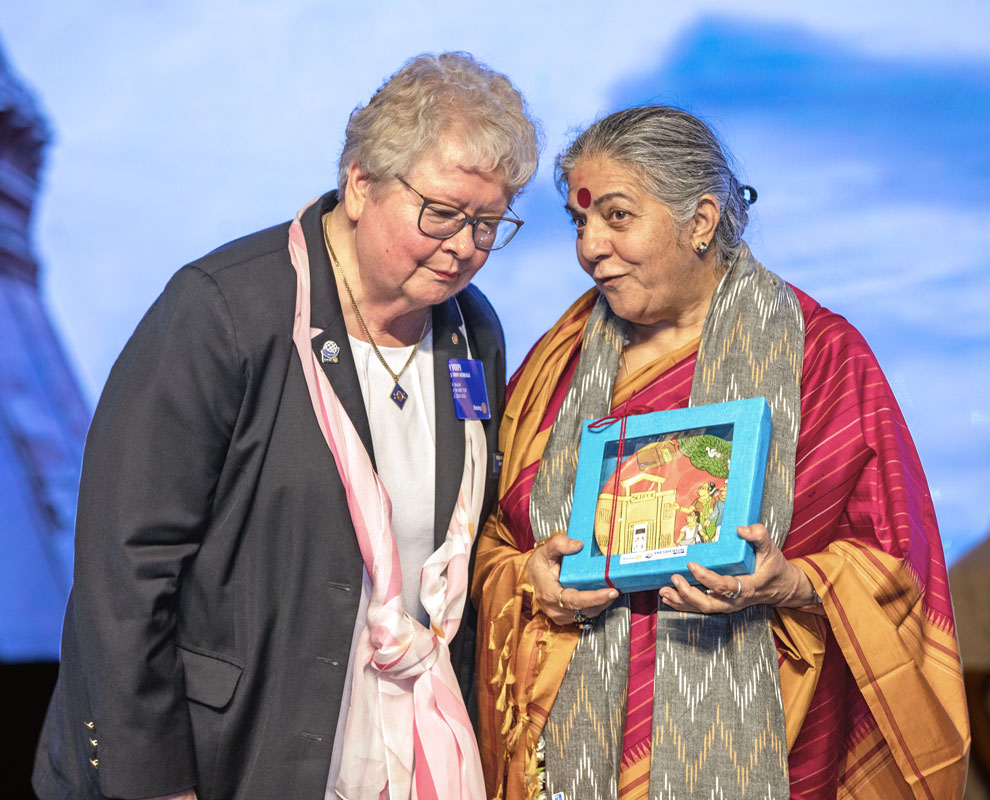
It is high time that each one of us in this planet realise that our environment is our collective responsibility and everyone have a role to play in preserving and protecting it in every possible way with a sensible approach,” said climate activist Vandana Shiva addressing a session on ‘Supporting Environment’ chaired by RI Director Virpi Honkala at the Hyderabad presidential conference. “It is not just ‘climate disaster’, rather a ‘health disaster’ for our earth and there is no Planet B. Science is increasingly recognising our philosophy that the earth is a living system, and the denial of this fact is proving to be disastrous for all its inhabitants,” she said. Condemning the mindless felling of trees, she warned that the elements of nature are all inter- related and has an impact on our very possibility to exist on this planet.
Referring to India’s most powerful forest conservation measure, the Chipko Movement, Vandana said that the concept of “hugging a tree to defend it was so powerful, it brought in a new consciousness to the country that put environment at its centre. These are not timber mines, these are sources of our soil, water, our breath, said the women activists, defending the reckless deforestation that was denuding much of the forest cover.” The movement originated in 1973 in a remote village Reni in the Himalayas, and went on to become a rallying point for many future environment protection movements all over the world.
The horrendous heatwave, the Kedarnath disaster of 2013, the Rishi-Ganga disaster that destroyed Reni, the village where the Chipko movement had started, and the several natural calamities which have become more frequent than ever before should alert us to be proactive in our environment conservation efforts. “Climate change is the defining crisis of our time and it is happening even more quickly than we feared.”
Citing the recent rise in chronic diseases, Vandana said, “it is the impact of producing highly toxic agricultural materials that are carcinogenic. We are polluting our soil and turning our precious land into a desert.”
Another hazard is the new varieties of seeds, industrial farming and the chemicals used therein causing gluten allergies. “But our ancient varieties are much better and grow very well. Seeds are not an invention of a chemical company. Seeds are a story of evolution, an innovation of our ancestors. Our land has created 200,000 rice varieties,” she pointed out, and enlisted Rotary’s partnership for helping farming communities.
Encouraging organic farming she said that it will address all the nutrient deficiencies of the soil. The organic matter added to the soil creates humus that can hold water. “One per cent humus can hold 160,000 litres of water per hectare. Almost 97 per cent of the world’s soil is on the verge of desertification. If we work in sync with the laws of the earth to re-green the earth, maximise biodiversity and photosynthesis, the earth will perform miracles for us. Let us use the wisdom of our ancestors to create a world that is liveable for future generations of all species. The health of our planet is related to our health because we are made of the same pancha boothas that our earth is made of. So every harm made to the planet is a harm made to ourself,” said Vandana.
Moderating a panel discussion at the session DGE Sandip Agarwalla recalled RI President Shekhar Mehta’s commitment to save and restore mangroves across the world at the UN Climate Change Conference COP26 held in Glassgow. “Over 20 countries that participated in the discussions have agreed to work with Rotary for the cause.”
Talking about how mangroves help in fighting climate change, panellist M Adarsh Reddy, DFO, Mumbai Mangrove Conservation Unit, said that mangrove ecosystems have the highest potential for carbon sequestration and helps in faster removal of greenhouse gases from the atmosphere. Encroachments and debris dumping were the challenges in mangrove preservation in coastal Maharashtra, he pointed out.
Natwest Foundation head Sunil N Kumar and climate activist Licipriya Kangujam were the other panellists. Sunil Kumar said that the industrial sector should take care of GHG emissions and largely switch over to renewable energy. Thirteen-year-old Licipriya spoke about her campaigns for climate action in India, to pass new laws to curb the high pollution levels and to make lessons on climate change mandatory in schools.
Picture by Jaishree





